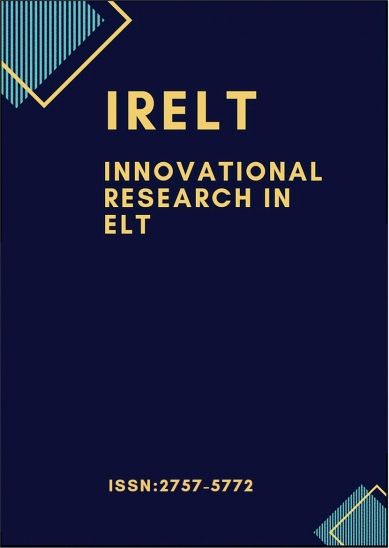Research article | Open Access
Innovational Research in ELT 2024, Vol. 5(2) 57-65
Teachers' Opinions on Intercultural Competence: A Focus On Instagram
pp. 57 - 65 | DOI: https://doi.org/10.29329/irelt.2024.1086.4
Publish Date: December 21, 2024 | Single/Total View: 173/147 | Single/Total Download: 194/158
Abstract
One of the main objectives of English language teaching is to increase students' intercultural competence (IC). People who will accomplish this goal are mainly English language teachers. For those teachers to assist their students, they must possess strong intercultural competencies. Consequently, it is vital to examine what English language teachers do in this context, but it is even more crucial to find out what they believe about intercultural competence. Traveling overseas and experiencing the target culture firsthand provide English language teachers with a valuable chance to hone their intercultural competency. Indeed, going abroad to travel, train, or receive training requires time and money. Social media is a novel and practical way for educators who lack these possibilities to build relationships with the target culture without having to relocate. There are a few studies about English language teachers' opinions of IC; however, given the current state of technology, social media needs to be covered in IC research. Thus, the purpose of this qualitative study was to learn more about the opinions of English language teachers on the use of Instagram for IC. The participants were English language teachers employed by public schools in Türkiye at the secondary and high school, and English instructors at universities. Data were gathered through semi-structured interviews. Based on the survey utilized in Sercu's (2005) study, the interview questions were created. Permissions from the relevant ethics committee were secured. Content analysis was used to examine and categorize the data. The findings showed that the educators believed that Instagram use helped in the development of intercultural competency. English language teachers reported feeling good about the target culture, knowing about it, and having positive attitudes toward the people of the target culture. This study offers recommendations on how foreign language teachers might utilize Instagram as a social media tool to help students and themselves become more intercultural competent.
Keywords: Intercultural competence, English language teaching, Social media tools, Instagram, English language teachers.
APA 7th edition
Canli, Z., & Yardimci, A. (2024). Teachers' Opinions on Intercultural Competence: A Focus On Instagram. Innovational Research in ELT, 5(2), 57-65. https://doi.org/10.29329/irelt.2024.1086.4
Harvard
Canli, Z. and Yardimci, A. (2024). Teachers' Opinions on Intercultural Competence: A Focus On Instagram. Innovational Research in ELT, 5(2), pp. 57-65.
Chicago 16th edition
Canli, Zeynep and Aylin Yardimci (2024). "Teachers' Opinions on Intercultural Competence: A Focus On Instagram". Innovational Research in ELT 5 (2):57-65. https://doi.org/10.29329/irelt.2024.1086.4
Alamri, B. (2018). The role of social media in intercultural adaptation: A review of the literature. English Language Teaching, 11(12), 77-85. https://doi.org/10.5539/elt.v11n12p77
Álvarez Valencia, J. A., & Fernández Benavides, A. (2019). Using social networking sites for language learning to develop intercultural competence in language education programs. Journal of International and Intercultural Communication, 12(1), 23-42. https://doi.org/10.1080/17513057.2018.1503318
Backlinko Team (2024, November 7). Instagram statistics: Key demographic and user numbers. Backlinko. https://backlinko.com/instagram-users#most-instagram-users-by-country
Daneshjo, A. (2023). Instagram and its influence on young girls: A study in Mysore city. International Journal on Transformations of Media, Journalism & Mass Communication, 8(2), 8-22.
Eğinli, A. (2011). The importance of the training of cultural diversity in obtaining intercultural competency. Marmara University Oneri Journal, 9(35), 215-227.
Fornara, F. (2018). Instagram for the development of foreign language students' intercultural competence (Publication No. 10750254) [Doctoral Dissertation, The Florida State University]. ProQuest Dissertations and Theses Global.
Fungchomchoei, S., & Kardkarnklai, U. M. (2016). Exploring the intercultural competence of Thai secondary education teachers and its implications in English language teaching. Procedia-Social and Behavioral Sciences, 236, 240-247. https://doi.org/10.1016/j.sbspro.2016.12.017
Groenewald, T. (2004). A phenomenological research design illustrated. International Journal of Qualitative Methods, 3(1), 42-55.
Hu Y., Manikonda L., Kambhampati S. (2014, June 1–4). What we Instagram: A first analysis of Instagram photo content and user types. Proceedings of the Eighth International Conference on Weblogs and Social Media. https://www.aaai.org/Library/ICWSM/icwsm14contents.php
Lane, T. Y. (2017). Tribulations and achievements: The lived experiences of African American college students formerly in foster care. Journal of Human Behavior in the Social Environment, 27(3), 141-150. https://doi.org/10.1080/10911359.2016.1262805
Leung, K., Ang, S., & Tan, M. L. (2014). Intercultural competence. Annual Review of Organizational Psychology and Organizational Behavior, 1(1), 489-519. https://doi.org/10.1146/annurev-orgpsych-031413-091229
Levitt, H. M., Bamberg, M., Creswell, J. W., Frost, D. M., Josselson, R., & Suárez-Orozco, C. (2018). Journal article reporting standards for qualitative primary, qualitative meta-analytic, and mixed methods research in psychology: The APA publications and communications board task force report. American Psychologist, 73(1), 26. https://doi.org/10.1037/amp0000151
Liu, M. (2019). Impact of social media on intercultural communication competence of Chinese people living in Sweden. Digital Scientific Archive.
Miles, M. B., & Huberman, A. M. (1994). Qualitative data analysis: An expanded sourcebook. Sage.
Morrell, P. D., & Carroll, J. B. (2010). Conducting educational research: A primer for teachers and administrators. Sense Publisher.
Neuman, W. L. (2006). Social Research Methods: Qualitative and Quantiative Approaches. Toronto: Pearson.
Ngai, P. B., Yoshimura, S. M., & Doi, F. (2020). Intercultural competence development via online social networking: The Japanese students’ experience with internationalisation in US higher education. Intercultural Education, 31(2), 228-243. https://doi.org/10.1080/14675986.2019.1702289
Sercu, L., & Bandura, E. (2005). Foreign language teachers and intercultural competence: An international investigation (Vol. 10). Multilingual Matters.
Sercu, L. (2005). Foreign language teachers and intercultural competence: An investigation in 7 countries of foreign language teachers' views and teaching practices. Multilingual Matters.
Vurdien, R. (2014). Social networking: Developing intercultural competence and fostering autonomous learning. Research-publishing.net. https://doi.org/10.14705/rpnet.2014.000252
Yıldırım, A., & Şimşek, H. (2013). Qualitative research methods in social sciences [Sosyal bilimlerde nitel araştırma yöntemleri]. Seçkin Publications
Zinker J. (1978). Creative process in gestalt therapy. New York: Vintage.
